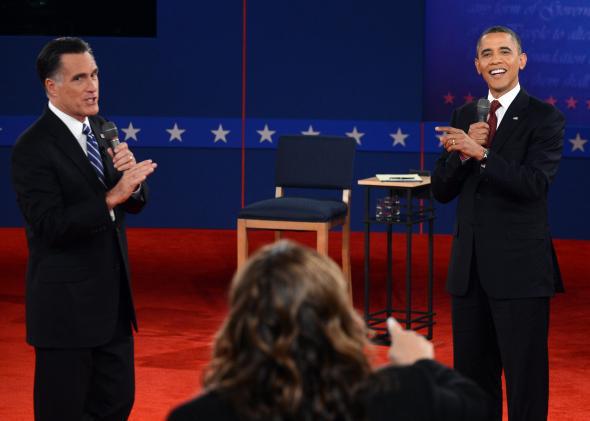Televised presidential debates tend to be about three people: The two candidates—and the moderator. In 2012, President Obama and Mitt Romney squared off on stage three different times, and after each debate the national conversation that followed was as much about the journalist asking the questions as it was about the candidates answering them. Liberals complained PBS’s Jim Lehrer was too passive. Conservatives claimed CNN’s Candy Crowley was too aggressive. Even CBS News’ Bob Schieffer, who drew relatively good marks from both sides of the aisle, was criticized for allowing a debate that was supposed to be about U.S. policy abroad to turn into one about the economy at home.
We don’t yet know who will be on stage in 2016, but it’s a safe bet that we will see the same dynamic play out. As long as there are referees to be worked, campaigns will try to work them. But what if there were no moderators to complain about? What if the candidates had no one to blame but themselves?
That’s more or less the thrust of several major debate reforms being proposed by a bipartisan group of former campaign officials. In a lengthy report released Wednesday, the Annenberg Working Group on Presidential Campaign Debate Reform calls for drastically reducing the role of the moderator in the general election’s marquee events. While the group isn’t recommending eliminating moderators completely, it wants to scale back their power substantially and open up the pool of potential moderators to include non-journalists such as university presidents, historians, and retired judges. Taken together, the reforms would look to address criticism of the journalists who host the debates by largely removing them from the equation.
The group’s most striking suggestion is to switch at least one of the presidential debates to what it calls the “chess clock” model. Under that format, each candidate would be allotted 45 minutes at the start of the debate to use as they wish. Anytime a candidate is talking, his clock counts down. If the other candidate wants to jump in, all she would need to do is hit the chess clock, stopping the opponent’s time and starting her own. Once a candidate’s time hits zero, they’d no longer get to speak, effectively ceding the floor for the remainder of the debate. “Under this model, candidates can choose to go into greater detail on matters of greater importance to them,” the report explains, “they are not compelled to pad time on others.” The moderator would still be there to help steer the debate by introducing each new topic, but it would be up to the candidates themselves to ask any follow-ups.
Limiting the role of the moderator, the panel argues, would also make the job more feasible for any number of political experts with less television experience. That, the group says, would mean that the moderators would be more focused on making the debate run smoothly than on making news—or, in the panel’s words, it would eliminate “the inherent tension in the role of journalists acting in their capacity as journalists while also performing as moderators.”
The recommendations are just that—any changes to the tried-and-true format would need to come from the Commission on Presidential Debates, a group that is typically pretty resistant to major change. Still, the working group behind the report has quite a bit of political heft. The 16-person team was brought together by Kathleen Hall Jamieson, the director of the Annenberg Public Policy Center at the University of Pennsylvania, and co-chaired by Anita Dunn, a senior adviser on Obama’s 2012 campaign, and Beth Myers, a senior adviser on Romney’s team, who were joined by a host of other prominent former campaign officials.
The reforms sound promising in theory, but it remains to be seen what they would look like in practice. As the 2012 debates proved time and time again, when the curtain goes up, the rulebook tends to get thrown out.
Previously in Slate:
